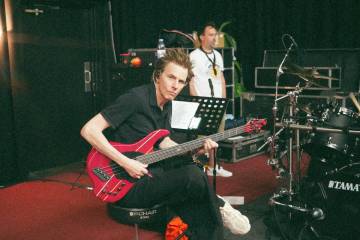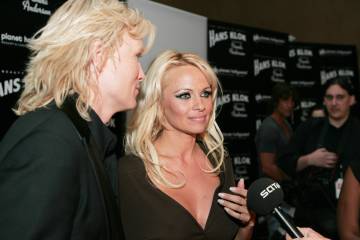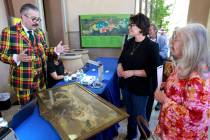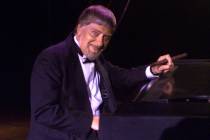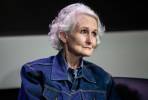Revival of ‘Pippin’ borrows big top elements to tell tale of self-discovery
The more things change, the more they stay the same. Or maybe it’s the other way around.
That push-pull rhythm of changing times, and timeless themes, provides an unmistakable accompaniment to “Pippin.”
The Tony-winning revival’s national tour arrives at The Smith Center’s Reynolds Hall on Tuesday for eight performances — and the revamp conjures observations, past and present, from two major players who’ve been there from the show’s first steps back in the 1970s.
One of them, of course, is composer Stephen Schwartz — whose Broadway blockbuster “Wicked” just departed Reynolds Hall after a monthlong run.
The other: Tony-winning actor John Rubinstein, “Pippin’s” first Pippin. Son of the medieval king Charlemagne, Pippin’s determined to find his “Corner of the Sky” — no matter how much wandering it takes.
As the son of concert pianist Arthur Rubinstein, John Rubinstein knows something of life with a legendary father — which may inform his portrayal of Charlemagne, a role he’s played on Broadway and on the current tour.
“When you’re in something from its origins, you tend to feel very proprietary,” Rubinstein says during a telephone interview from a Southern California tour stop. “It’s like the first symphony recording of Beethoven you hear. To you, that’s the way that symphony sounds.”
That is, until you go to a concert and hear it another way. Which is exactly what’s happened to “Pippin,” Rubinstein notes.
The first time around, the musical — directed and choreographed by showbiz titan Bob Fosse — was based on dancing, Rubinstein says, drawing a connection between Fosse’s Oscar-winning 1972 musical “Cabaret” and the overall “dark and sinister and sinuous and weird” style of “Pippin.”
“That’s what our ‘Pippin’ was,” he says, “very sinister and dark,” with the innocent title character wandering “a very, very harsh and volatile” outside world.
In short: it was “the devil against the everyman,” the devil embodied by the Leading Player (portrayed by “The Voice” finalist Sasha Allen), who with her fellow traveling performers tempts Pippin with notions of fame and power. (Ben Vereen won a Tony as “Pippin’s” original Leading Player.)
That 1972-model “Pippin” had “implications of a circus-y” atmosphere, Schwartz acknowledges, but “this production takes that much further,” with “actual acrobats and circus performers” onstage — including the central characters.
“The entire company participates — that’s what makes the performance so exhilarating,” says Schwartz, who’s been in California working on a stage version of “The Hunchback of Notre Dame.” (Based on the 1996 Disney animated feature, for which he wrote lyrics to Alan Menken’s music, the adaptation just opened at San Diego’s La Jolla Playhouse.)
Initially, Schwartz had his doubts about going the circus route with this “Pippin” revival, which originated at the Harvard-affiliated American Repertory Theater in Cambridge, Mass. (If ART sounds familiar, it should; the regional theater co-produced Teller’s reworking of Shakespeare’s “The Tempest,” which premiered at The Smith Center in April, and launched the Tony-winning “Porgy and Bess” revival that played Reynolds Hall the same month.)
“My concern was that it would be a gimmick, (one that) might detract from the storytelling,” the composer says. After all, it’s happened to him before — with “Wicked,” where an “extremely flashy production” with “a lot of stuff to look at” blinded critics (if not audiences) to deeper themes.
At first, Schwartz says, he didn’t really understand how integrated director Diane Paulus’ circus concept would be. But, he adds, when he began to see how Diane was using it, how the circus and dance elements were being used to tell the story, he was reassured.
“My trust was definitely not misplaced,” he says.
Those circus elements proved a sometimes daunting challenge for Lucie Arnaz, who plays the grandmotherly, life-affirming Berthe— and sings her big number, “No Time at All,” while hanging from a trapeze.
“It’s the most unusual skill I’ve ever gotten the chance to learn,” says Arnaz, daughter of showbiz legends Lucille Ball and Desi Arnaz. “Especially at 63.”
As for what she’s thinking while she’s high off the stage, the phrase “I can’t believe I’m doing this” crosses her mind “every moment of the routine.” After all, Arnaz says she had only four weeks to learn the role, which she’s performed on Broadway as well as on tour.
“It’s isn’t like when you’re in a regular musical,” says Arnaz — who’s done plenty of them, from “My One and Only” to “Dirty Rotten Scoundrels” — “where you learn your dances and songs” during rehearsal, then “you go home and stay up all night to practice.”
In Rubinstein’s view, this “Pippin’s” circus theme “has sort of leavened the whole thing,” giving the show an explosive feel, full of light and color.
The shift in tone also inspired Schwartz and librettist Roger O. Hirson, who revisited and revised portions of the book and portions of the score, the composer says, from “lyrics I felt I could improve” to revamped orchestral arrangements that weren’t so period-specific, because the originals “were written in the ’70s and sounded that way.”
Overall, Schwartz says, “we revisited every aspect of the show to make it work for contemporary audiences,” from the ending to some of the show’s sardonic war references — originally inspired by Vietnam, now by contemporary conflicts in Iraq, Afghanistan and beyond.
The nature of war may have changed, Schwartz says, but “Pippin’s” take on it, and other human foibles, hasn’t.
“I have a lot of faith in audiences, (who) come to something to be entertained — but also to be engaged, to be told a story they can relate to and care about, (something that) can speak to them about their own lives.”
And “Pippin” — with its tale of youthful optimism, tempered by real-world experience — remains ever relevant, in Arnaz’s view.
When her character sings, “Oh, it’s time to start livin’, time to take a little from this world we’re given, time to take time, ’cause spring will turn to fall, in just no time at all,” Arnaz says “I’m completely playing myself — I believe every word.”
For Rubinstein, what the show has to say, about trying to find an extraordinary, meaningful life remains as powerful now as when it first appeared more than four decades ago.
“It’s an interesting situation for composers and writers to revisit a work 10 or 20 years later,” he says, citing Shakespeare as one example. “It’s really a brand-new ‘Pippin.’ ”
And, Schwartz concludes, “That’s the nice thing about theater. It’s alive. If you find a way to make it better, you can.”
Contact reporter Carol Cling at ccling@reviewjournal.com or 702-383-0272. Follow @CarolSCling on Twitter.
Preview
"Pippin"
7:30 p.m. Nov. 25-Nov. 28, 2 and 7:30 p.m. Nov. 29-30
Reynolds Hall, The Smith Center for the Performing Arts, 361 Symphony Park Ave.
$39-$139 (702-749-2000, www.thesmithcenter.com)











